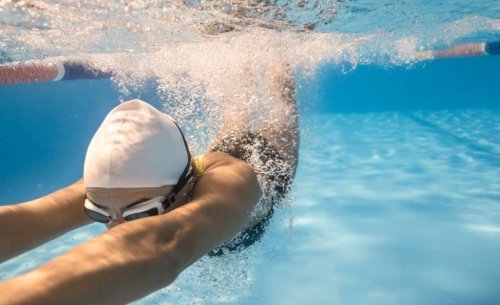The Advantages and Disadvantages of Swimming

If you want to practice swimming, you’ve surely done a little research on this sport? Swimming offers one of the best full body workouts in existence. However, if you still have questions, we’ll help clear them up by explaining the advantages and disadvantages of swimming.
You might like: Five Exercises for Swimmers
The advantages of swimming
Let’s start with the “good news” about this sport. Here are six advantages of swimming, a sport practiced year round by people of all ages.
1. It helps you slim down
When you swim, your body must confront the force of water, but you almost don’t even realize the extra effort it takes. The added resistance stimulates your metabolism, which means that you burn more calories. Therefore, you also increase the possibility of losing weight.
2. It’s good for your joints
Swimming doesn’t involve any impact on the ground, which means your knees don’t have to cope with added force from the impact. For example, when you work out on the ground, running or jumping, your knees have to tolerate a lot of impact due to gravity and your body weight.
When you float, on the other hand, your muscles don’t have to support your weight. For this reason, swimming is recommended for those with arthritis or muscle pain, and those who are overweight.
3. Swimming helps prevent diseases
When you swim, you help prevent diseases such as osteoporosis, which affects the bones in women over 45 years old. Additionally, swimming strengthens the immune system and reduces the cases of colds and the flu during winter.

4. Swimming reduces stress
Swimming favors the production of the neurotransmitter dopamine, which is responsible for regulating moods. In addition to this, this sport also helps reduce anxiety, allows for mental relaxation, and reduces stress. It also allows you to sleep better and eliminate insomnia.
5. It strengthens your heart
One of the main advantages of swimming, which is true for all aerobic sports, is that it strengthens your heart function and improves your circulatory system in general. This means that it helps regulate blood pressure, reduces the risk of suffering from heart attacks, and even “cleans out” the arteries.
6. Swimming allows you to socialize more
Unless you rent out a swimming pool for just yourself, or you have an Olympic size swimming pool at home, in order to practice swimming you’ll have to interact with other people. In addition, they might even be the same age as you and become good friends or workout buddies.
This is a great advantage for people who live alone or who don’t have a lot of friends, as it will help generate a connection with other people who share similar hobbies.
You might like: Can Adults Learn to Swim?
The disadvantages of swimming
While swimming is a full body workout and has a lot of benefits, we also need to point out the five main disadvantages of swimming:
1. It increases the risk of certain injuries
One of the main disadvantages of swimming is that it increases the risk of certain injuries. This is because the repetitive movements of swimming can sometimes be detrimental to your joints or tendons.
As a result, swimming increases the risk of tendinitis, which tends to appear when you do more exercise than recommended. It can affect the joints and it’s usually quite painful.
2. Fungal infections
Mycosis, or an infection caused by a fungus, is another one of the disadvantages of swimming. However, this is true for any other sport if you use the shower at the gym after working out. Foot fungus is one of the most common types of mycosis and can appear when you don’t dry between your toes.
3. Skin allergies
Pools are disinfected with a lot of chemical products such as chlorine. This substance can not only generate skin allergies but can also irritate the mucous membranes, particularly the eyes. You can reduce the risk of eye irritation by wearing good quality swimming goggles.

4. You need some extra equipment
In order to practice swimming, you’ll need a pool but also some other essential pieces of equipment or accessories. For example, you’ll need an activewear swimsuit and a cap for your head. Additionally, there isn’t always a nearby pool to practice swimming.
Furthermore, if you find a pool to go to, you’ll probably have to pay a monthly or yearly fee.
5. You might quit in winter
During the summer, swimming is a wonderful activity because it cools you down and allows you to be in the pool without going on vacation. However, when winter arrives, it’s likely that you’ll quit this sport.
The simple acts of changing your clothes, showering, getting out of the water with wet hair, and having to think about a swimsuit when it’s cold outside, are enough motivation to say “no” to this activity.
At the same time, we often relate swimming with winter colds or the flu. However, this happens when you don’t wear enough warm clothing after leaving the gym. Additionally, this can also happen when you spend too much time wearing wet clothes.
If you’re careful, there’s no reason why you should end up being unwell after a swimming class.
As you can see, there are more advantages than disadvantages to swimming. Moreover, you can reduce the likelihood of these last disadvantages of swimming by being careful and improving some habits.
We recommend that you swim at least two times per week to take advantage of all the benefits of swimming.
If you want to practice swimming, you’ve surely done a little research on this sport? Swimming offers one of the best full body workouts in existence. However, if you still have questions, we’ll help clear them up by explaining the advantages and disadvantages of swimming.
You might like: Five Exercises for Swimmers
The advantages of swimming
Let’s start with the “good news” about this sport. Here are six advantages of swimming, a sport practiced year round by people of all ages.
1. It helps you slim down
When you swim, your body must confront the force of water, but you almost don’t even realize the extra effort it takes. The added resistance stimulates your metabolism, which means that you burn more calories. Therefore, you also increase the possibility of losing weight.
2. It’s good for your joints
Swimming doesn’t involve any impact on the ground, which means your knees don’t have to cope with added force from the impact. For example, when you work out on the ground, running or jumping, your knees have to tolerate a lot of impact due to gravity and your body weight.
When you float, on the other hand, your muscles don’t have to support your weight. For this reason, swimming is recommended for those with arthritis or muscle pain, and those who are overweight.
3. Swimming helps prevent diseases
When you swim, you help prevent diseases such as osteoporosis, which affects the bones in women over 45 years old. Additionally, swimming strengthens the immune system and reduces the cases of colds and the flu during winter.

4. Swimming reduces stress
Swimming favors the production of the neurotransmitter dopamine, which is responsible for regulating moods. In addition to this, this sport also helps reduce anxiety, allows for mental relaxation, and reduces stress. It also allows you to sleep better and eliminate insomnia.
5. It strengthens your heart
One of the main advantages of swimming, which is true for all aerobic sports, is that it strengthens your heart function and improves your circulatory system in general. This means that it helps regulate blood pressure, reduces the risk of suffering from heart attacks, and even “cleans out” the arteries.
6. Swimming allows you to socialize more
Unless you rent out a swimming pool for just yourself, or you have an Olympic size swimming pool at home, in order to practice swimming you’ll have to interact with other people. In addition, they might even be the same age as you and become good friends or workout buddies.
This is a great advantage for people who live alone or who don’t have a lot of friends, as it will help generate a connection with other people who share similar hobbies.
You might like: Can Adults Learn to Swim?
The disadvantages of swimming
While swimming is a full body workout and has a lot of benefits, we also need to point out the five main disadvantages of swimming:
1. It increases the risk of certain injuries
One of the main disadvantages of swimming is that it increases the risk of certain injuries. This is because the repetitive movements of swimming can sometimes be detrimental to your joints or tendons.
As a result, swimming increases the risk of tendinitis, which tends to appear when you do more exercise than recommended. It can affect the joints and it’s usually quite painful.
2. Fungal infections
Mycosis, or an infection caused by a fungus, is another one of the disadvantages of swimming. However, this is true for any other sport if you use the shower at the gym after working out. Foot fungus is one of the most common types of mycosis and can appear when you don’t dry between your toes.
3. Skin allergies
Pools are disinfected with a lot of chemical products such as chlorine. This substance can not only generate skin allergies but can also irritate the mucous membranes, particularly the eyes. You can reduce the risk of eye irritation by wearing good quality swimming goggles.

4. You need some extra equipment
In order to practice swimming, you’ll need a pool but also some other essential pieces of equipment or accessories. For example, you’ll need an activewear swimsuit and a cap for your head. Additionally, there isn’t always a nearby pool to practice swimming.
Furthermore, if you find a pool to go to, you’ll probably have to pay a monthly or yearly fee.
5. You might quit in winter
During the summer, swimming is a wonderful activity because it cools you down and allows you to be in the pool without going on vacation. However, when winter arrives, it’s likely that you’ll quit this sport.
The simple acts of changing your clothes, showering, getting out of the water with wet hair, and having to think about a swimsuit when it’s cold outside, are enough motivation to say “no” to this activity.
At the same time, we often relate swimming with winter colds or the flu. However, this happens when you don’t wear enough warm clothing after leaving the gym. Additionally, this can also happen when you spend too much time wearing wet clothes.
If you’re careful, there’s no reason why you should end up being unwell after a swimming class.
As you can see, there are more advantages than disadvantages to swimming. Moreover, you can reduce the likelihood of these last disadvantages of swimming by being careful and improving some habits.
We recommend that you swim at least two times per week to take advantage of all the benefits of swimming.
All cited sources were thoroughly reviewed by our team to ensure their quality, reliability, currency, and validity. The bibliography of this article was considered reliable and of academic or scientific accuracy.
- Arribas, I. S. (2002). Natación y flexibilidad. Revista Internacional de Medicina y Ciencias de La Actividad F’isica y Del Deporte.
This text is provided for informational purposes only and does not replace consultation with a professional. If in doubt, consult your specialist.








